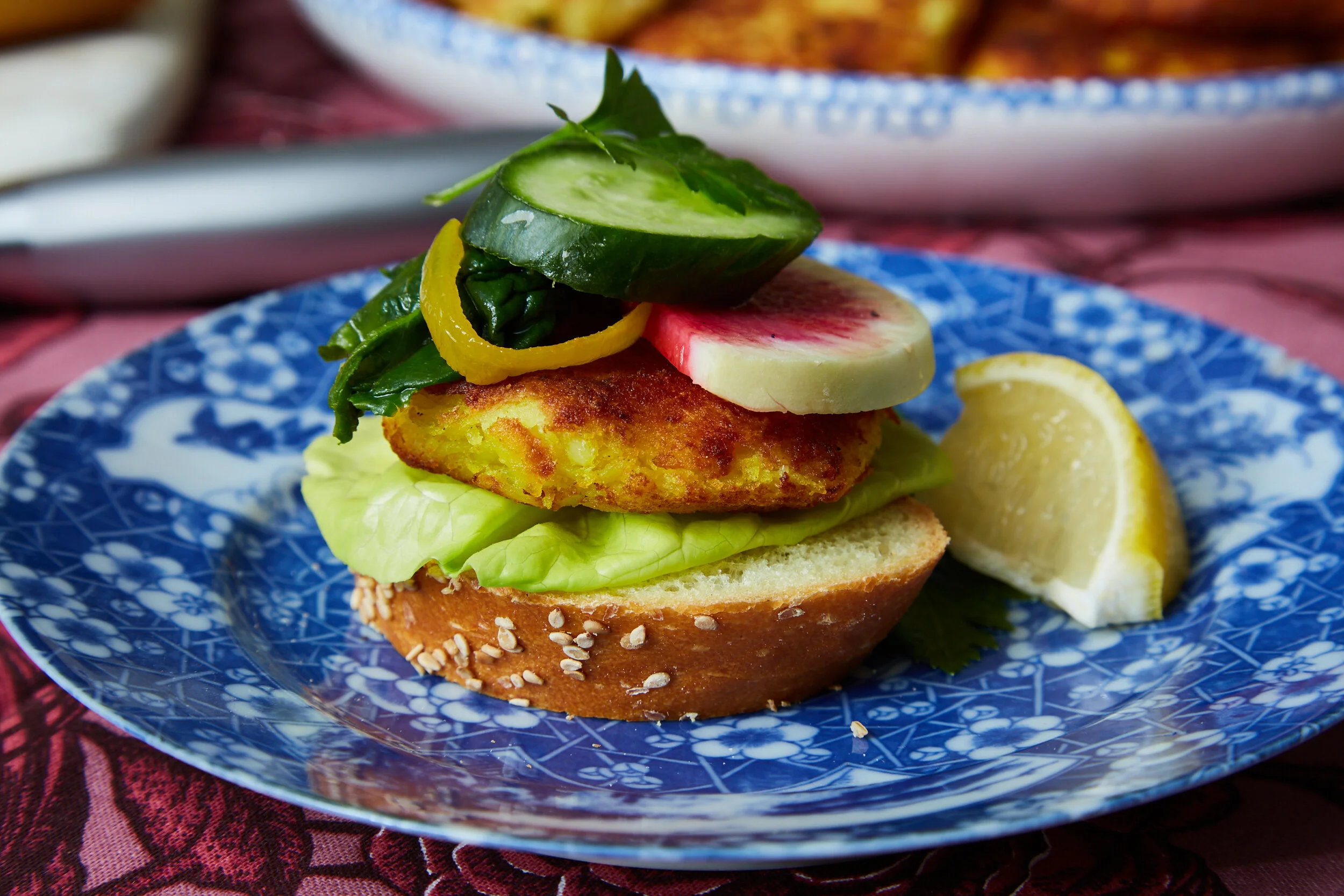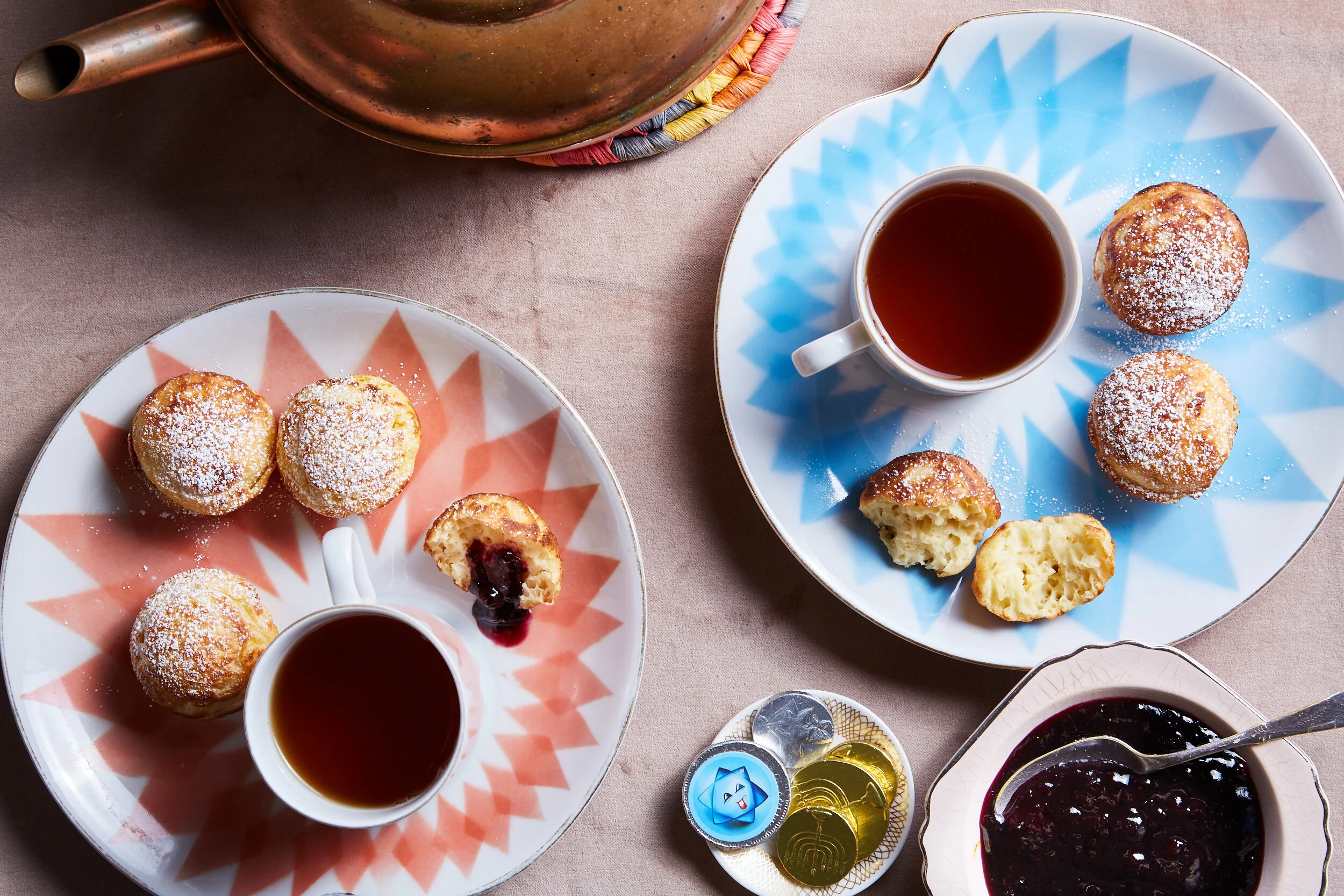From Shiraz to Los Angeles and Israel, Shami Is This Family’s Friday Snack
Shared by: Jazzie Einalhori
Recipe Roots: Shiraz, Iran > Tel Aviv > Toronto > Los Angeles > New York City
In Jazzie Einalhori’s family, there is no Friday afternoon without shami, a Persian potato fritter made with caramelized onions and turmeric, that’s paired with a spinach and onion spread and spritzed with lemon just before it’s devoured. Everyone in the family has their preferred way of eating the fritters. Some opt to sandwich them into a baguette, others with pita — Jazzie’s sister likes them with ketchup. In the family, Jazzie’s grandmother Esther is the keeper of the shami. In college, when Jazzie would fly from New York to Los Angeles to see her family, she would call her grandmother to let her know when her flight would land so the shami would be fresh. “I’ll call you, so it’s hot,” she would loving and jokingly tease her grandmother.
The recipe and Friday tradition are traced back to Esther’s mother Rachel, who lived in Shiraz, Iran. Rachel brought the recipe with her when the family moved to Be’er Sheva in southern Israel in 1949. Here, Esther reconnected with Itzchak, who she knew in Shiraz, in the ma’abara, or absorption camps for immigrants from North Africa and the Middle East. Itzchak arrived with a razor to cut hair and opened a barber business in the camp. “He made it through because he was the only guy with a razor,” Jazzie explains. The pair married and lived in Israel, but left after the Six Day War in 1967 for North America, bringing the shami recipe and tradition with them.
When Jazzie was little, her grandfather, nicknamed papa joon, or sweet papa in Farsi, would bring fresh shami from Esther to the school where Jazzie was a student and her mother Lily worked, for them to enjoy on Friday afternoons. Shami wasn’t the only recipe Esther made on Fridays. Shabbat dinner was always a bountiful spread of Persian recipes like gondi, a chicken soup made with dumplings, colorful rice, and a stew or khoresh. Even when Esther and Itzchak didn’t host, and an aunt did, her grandparents still “they owned the presence” of the shabbat meal, Jazzie explains.
When she was 18, Jazzie left Los Angeles to live in Israel — and the shami tradition continued there. On Fridays, cousins of her mother would make shami or aruk, a Iraqi sibling of the fritter made with potato and parsley that one aunt learned to make for her Iraqi husband. “In Israel it’s normal to have a Friday snack,” Jazzie explains, to tide everyone over to dinner.
Jazzie didn’t start making the recipe until she moved back to the U.S. and was in school at NYU with her brother. She called her grandmother for instructions and even in her first attempt it was “pretty spot on,” Jazzie explains. “I think I have hands like a safta,” she adds. Today, she uses them to make schnitzel, sabich, and salted tahini chocolate chip cookies for Sage Kitchen, a restaurant and catering company where she is the co-founder and executive chef.
As for the shami, it’s not on the menu yet, but Jazzie’s considering adding it to lineup as a special — on Friday afternoons, of course.
Shami (Potato and Onion Fritter) with Spinach and Onion Spread
Makes: 16 to 18 fritters
Total Time: 2 hours
Ingredients
For the Spinach and Onion Spread:
4 tablespoons kosher salt
2 yellow onions, thinly sliced
¼ cup vegetable oil
2 tablespoons ground turmeric
2 bunches of spinach, de-stemmed
Salt to taste
For the Shami:
5 russet potatoes (about 2.5 lbs)
1 yellow onion, peeled
2 eggs
1 ½ tablespoons kosher salt
¼ cup reserved turmeric oil from the spinach and onion spread
Preparation
1. Make the spinach and onion spread: Fill a large pot with water and place it over high heat. Add 4 tablespoons of kosher salt into the pot and bring the water to a boil, about 10 to 15 minutes.
2. Place a medium saucepan over medium to low heat. Add ¼ cup vegetable oil.
3. Once the oil is hot, place the onions into the pan and saute for about 15 to 20 minutes until caramelized.
4. Set a colander over a large heatproof bowl. Transfer the caramelized onions with the cooking oil into the colander and allow to drain for about 10 to 15 minutes. Reserve the drained turmeric oil in a bowl and set it aside for the shami (potato and onion fritters).
5. Place the spinach in the large pot with boiling water and allow it to blanch for about 5 minutes until the spinach is tender. Drain the spinach over a colander and squeeze any excess liquid. Transfer the spinach to the bowl with the onions. Mix the spinach and onions to combine well.
6. Make the shami: Place the potatoes in a large pot and cover with cold water. Place the pot over high heat and bring it up to a boil, about 15 to 30 minutes. Reduce the flame to medium heat and boil the potatoes until they are fork-tender, another 20 to 30 minutes.
7. Drain the potatoes and allow them to cool for about 5 to 10 minutes until they can be handled. Peel the potatoes and grate them into large bowl with a box grater.
8. Grate the onion into the bowl with the potatoes. Add the eggs and salt into the bowl and mix to combine well.
9. Line a large sheet pan with paper towels. Set aside.
10. Place a large saucepan over medium heat and add about 2 tablespoons of turmeric oil. Allow the oil to heat up, about 3 to 5 minutes.
11. Scoop 1 generous tablespoon of the mixture into the palm of your hands and shape it into a flat circular patty with a 2 inch diameter. Gently place the patty into the saucepan and continue placing patties into the pan, about 6 patties should fit into the pan.
12. Fry the patties on each side until golden brown, about 2 minutes per side. Place the fried patties onto paper towels to drain any excess oil. Continue frying the fritters in batches.
13. Serve the shami hot with a generous squeeze of lemon juice and spinach and onion spread. You can serve the shami in a sandwich with any type of bread, a piece of romaine lettuce, cilantro, and sliced tomato and cucumbers.









